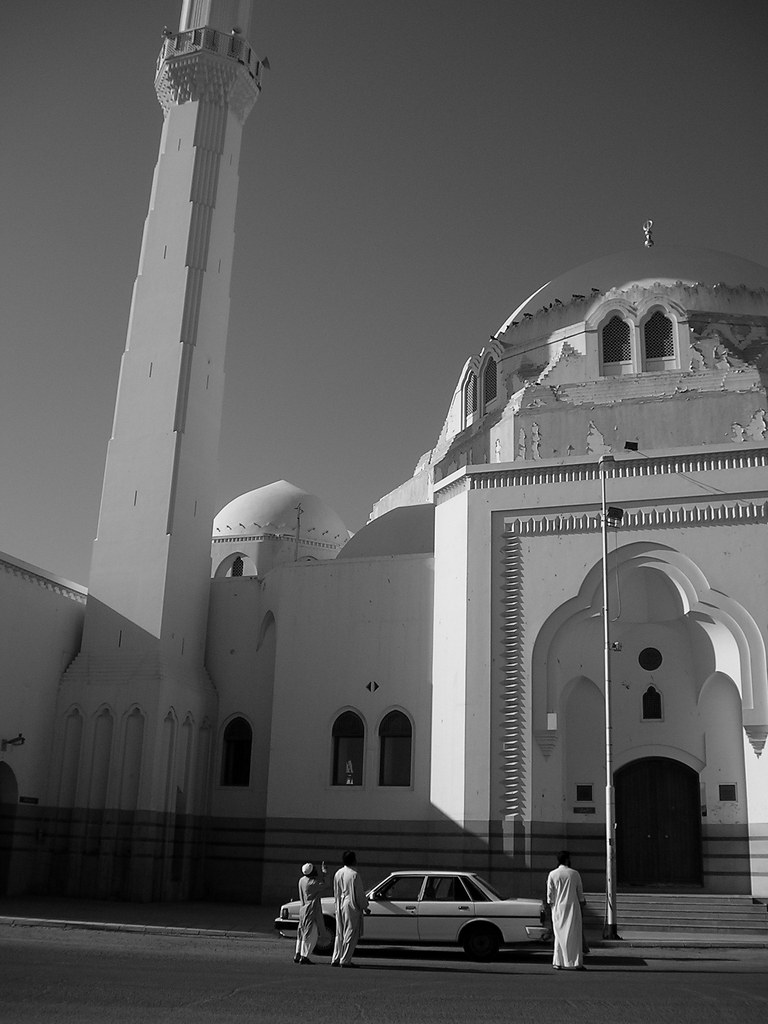 Photo: Saudi Arabia '04
Photo: Saudi Arabia '04Yesterday marked the first day of the month of Ramadan according to the Islamic calendar. I drove home just to get in the mindset of fasting and usually it is easier to do that with family. There seems to be a unique aura in the Muslim community around this time. People wake up before the sun comes up, food is cooked and we eat an early breakfast, people observe the religion meticulously and then of course the meal at the time of Maghrib (sundown). Although, fasting is the only obvious part of this month, there is a lot more to fasting than just not eating food.
Muslims use this month as a time of spiritual reflection and pay attention to the inside instead of devoting so much energy to the outside world. Once this month starts I am always amazed by how we tend to plan our days around meals and other worldly concerns. Then, one day all of that is gone and it is a lot easier to make a more spiritual connection with God. Food is not the only thing a muslim has to refrain from during this month. One must abstain from "food, drink and other sensual pleasures" where they may be readily available. One could be walking around the house and although no one else may be home he/she has to keep from eating food. This kind of will power strengthens their faith. Every year, when this month comes around I find a new way it makes me a better person.
I found this website about how non-Muslims can help fellow co-workers or friends during this month who may be fasting. The following is a list from this site.
How non-Muslims can help during Ramadan:
Companies, schools, hospitals, etc. can help their Muslim employees, students and patients during the fast of Ramadan in a number of ways:
Since the employees are on a fast, they might find it more difficult to handle strenuous tasks. Assignment of lighter duties in some cases would undoubtedly be deeply appreciated by Muslim employees.
"Special consideration can be given to such things as requests for vacation time, the need for flexible early morning or evening work schedules and lighter homework assignments." For example, working the day shift during Ramadan would enable the employee to break their fast in the evening with their families, and to attend evening prayers.
"It is also very important that Muslim workers and students be given time to attend Eid prayers at the end of Ramadan. Eid is as important to Muslims as Christmas and Yom Kippur are to Christians and Jews."
"Hospital workers should be aware that injections and oral medications might break the fast. Patients should be given the opportunity to decide whether or not their condition exempts them from fasting." 2
A small token such as an Eid card or baked goods given to a Muslim co-worker or friend during Eid ul-Fitr would also be greatly appreciated. These cards cards are available from Muslim bookstores, or can be sent online. 4

5 comments:
what mosque is that? the picture and post are great...
Thanks for posting this! (What kind of baked goods are most appropriate?)
maggie:Thanks.
That was a mosque in Medina, Saudi Arabia. I don't want to make a false statement, but I THINK that was the first mosque in Medina. When Prophet Muhammad p.b.u.h was deciding which invitation he will accept for his temporary residence in Medina he let his camel walk and told the city that he will stay whereever the camel stops. This way he wouldn't have to choose one person over the other. The camel slowed down by this spot and then stoped at a house next to it. The prophet muhammad stayed at that house and this is where the mosque was built. The companion of prophet Muhammad pbuh is burried in Eyüp, Turkey.
Vandemboom!
I am not sure what kind of baked good to tell you about because it is so culture specific. In people bring over all kinds of things. I can't think of a specific food.
Irum!
I don't know if you were with us when we went out for this. This may have been the year before.
thanks for the comment
Post a Comment